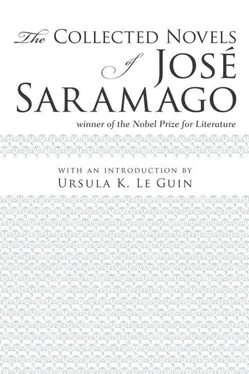Over the next few years there were not many changes in the family, apart from the arrival of more children, including two daughters, while the parents lost the last vestiges of youth. In the case of Mary that was not surprising, for we know how childbearing, and she had borne many children, gradually saps whatever freshness and beauty a woman possesses, causing her face and body to age and wither, suffice it to say that after James came Lisa, after Lisa came Joseph, after Joseph came Judas, after Judas came Simon, then Lydia, then Justus, then Samuel, and if any more followed, they perished without trace. Children are the pride and joy of their parents, as the saying goes, and Mary did her utmost to appear contented, but after carrying for months on end all those fruits that greedily consumed her strength, she often felt impatient, resentful, but in those days it would never have occurred to her to blame Joseph, let alone Almighty God who governs the life and death of His creatures and assures us that the very hairs of our heads are counted. Joseph had little understanding of the begetting of children, apart from the practical rudiments, which reduce all enigmas to one simple fact, namely, that if a man and woman come together, he will likely impregnate her, and after nine months, or on rare occasions after seven, a child is born. Released into the female womb, the male seed, minute and invisible, transmits the new being chosen by God to continue populating the world He has created. Sometimes, however, this fails to happen, and the fact that the transmission of seed into womb is not always sufficient to create a child is further evidence of the impenetrability of God’s design. Allowing the seed to spill onto the ground, as did the unfortunate Onan, whom the Lord punished with death for refusing in this way to give his brother’s widow children, rules out any possibility of the woman’s becoming pregnant. On the other hand, time and time again, as someone once said, the pitcher goes to the fountain until there is no more water and it comes back empty. For it was clearly God who put Isaac into the little seed that Abraham was still able to produce, and God who poured it into Sarah’s womb, because she was past conceiving children. Looking at things from a theogenetic angle, as it were, we may conclude without offending logic, which must preside over everything in this and every other world, that it was God Himself who spurred Joseph to keep having intercourse with Mary, so that they might have lots of children, helping Him assuage the remorse that plagued Him ever since He permitted, or willed, without considering the consequences, the massacre of those innocent children of Bethlehem. But the strangest thing of all, and which goes to show that the ways of the Lord are not only inscrutable but also disconcerting, is that Joseph truly believed he was acting of his own accord and obeying God’s will, as he made strenuous efforts to beget more and more children, to compensate for all those killed by Herod’s soldiers, so that the numbers would tally in the next census. God’s remorse and Joseph’s were one and the same, and, if people in those days were already familiar with the expression God never sleeps, we now know that the reason He never sleeps is that He made a mistake which no man would be forgiven. With every child begotten by Joseph, God raised His head a little higher, but He will never raise it fully, because twenty-seven infants were massacred in Bethlehem, and Joseph did not live long enough to impregnate one woman with that many children, and Mary, worn out in body and soul, could never have withstood that many pregnancies. The carpenter’s house and yard, though full of children, might as well have been empty.
On reaching the age of five, Joseph’s son started going to school. Each morning his mother took him to the synagogue and left him in the charge of the steward who taught beginners, and it was there in the synagogue-and-classroom that Jesus and the other little boys of Nazareth under the age of ten observed the wise man’s precept, The child must be instructed in the Torah just as the ox is bred in the corral. The lesson ended at the sixth hour, which we now refer to as midday. Mary would be waiting for her child, and the poor woman was not allowed to ask him what he was learning, even this simple right was. denied her, for as the wise man’s maxim categorically states, Better that the law go up in flames than it be entrusted to women. Besides, if by any chance little Jesus had already been taught the true status of women in this world, including mothers, he might have given her the wrong answer, the kind of answer that reduces one to insignificance. Take Herod, for example, with all his wealth and power, yet if we were to see him now, we would not even be able to say, He is dead and rotting, because he is nothing but mold, dust, bones, and filthy rags. When Jesus arrived home, his father asked him, What did you learn today, and Jesus, having been blessed with an excellent memory, repeated word for word and without a moment’s hesitation the lessons of the day. First the children were taught the letters of the alphabet, then the most important words, and finally whole sentences and passages from the Torah, which Joseph accompanied, beating out the rhythm with his right hand and slowly nodding his head. Standing aside, Mary looked on and learned things she was forbidden to ask, a clever stratagem on the part of women and practiced to perfection throughout the ages. Listening, they soon learn everything, even the difference between falsehood and truth, which is the height of wisdom. But what Mary did not understand, or understand completely, was the mysterious bond between her husband and Jesus, although even a stranger would have noticed the look of wistful tenderness on Joseph’s face when he spoke to his firstborn, as if he was thinking to himself, This beloved son of mine is my sorrow. All Mary knew was that Joseph’s nightmares, like a scourge on his soul, refused to go away, and were now so frequent that they became as much a habit as sleeping on the right side or waking up with thirst in the middle of the night. Mary, as a good and dutiful wife, still worried about her husband, but for her the most important thing of all was to see her son alive and well, a sign that Joseph’s crime had not been too serious, otherwise the Lord would have punished him without mercy, as was His wont. Take Job, broken and leprous, yet he had always been an honest, upright, and God-fearing man. Job’s misfortune was that he became involuntarily the cause of a dispute between Satan and God Himself, each clinging tenaciously to his own idea and prerogative. And yet they are surprised when a man despairs and cries out, Perish the day I was born and the night in which I was conceived, let that day turn to darkness and be erased from the calendar and that night become sterile and void of all happiness. It is true that God compensated Job by repaying him twice as much as He had taken, but what of all those other men, in whose name no book was ever written, men deprived of everything and given nothing in return, to whom everything was promised and nothing fulfilled.
But in this carpenter’s house life was peaceful, and however frugal their existence, there was always bread on the table and enough food to keep body and soul together. As for possessions, the only thing Joseph had in common with Job was the number of sons. Job had seven sons and three daughters, while Joseph had seven sons and two daughters, giving the carpenter the merit of having put one woman less into the world. However, before God doubled his possessions, Job already owned seven thousand sheep, three thousand camels, five hundred yokes of oxen, and five hundred donkeys, not to mention slaves, of which he had many, whereas Joseph has only his donkey and nothing else. And there’s no denying that it is one thing to feed two mouths, then a third, even if only indirectly during the first year, and quite another to find yourself saddled with a houseful of children who need more and more food when they start growing. Since Joseph’s earnings were not enough to allow him to hire an apprentice, it was only natural that he make his children work. Besides, this was his fatherly duty, for as the Talmud says, Just as a man must feed his children, he must also teach them to work, otherwise he turns his sons into good-for-nothings. And recalling the precept of the rabbis that the artisan must never think himself inferior to the greatest scholar, we can imagine how proudly Joseph began instructing his older sons one after another as they came of age, first Jesus, then James, then Joseph, then Judas, in the secret skills of the carpenter’s trade, ever mindful of the ancient proverb, A child’s service is little, yet he is no little fool that despises it. When Joseph returned to work after the midday meal, his sons lent him a hand, a good example of domestic economy and a way to establish a whole dynasty of carpenters for future generations, if God in His wisdom had not decreed otherwise.
Читать дальше












